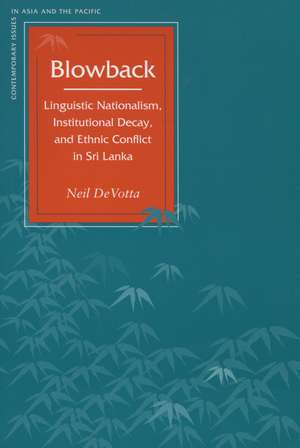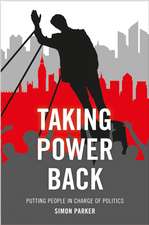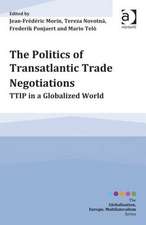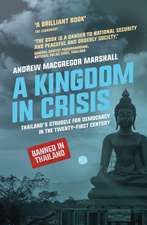Blowback: Linguistic Nationalism, Institutional Decay, and Ethnic Conflict in Sri Lanka: Contemporary Issues in Asia and Pacific
Autor Neil DeVottaen Limba Engleză Paperback – 8 apr 2004
In the mid-1950s, Sri Lanka’s majority Sinhalese politicians began outbidding one another on who could provide the greatest advantages for their community, using the Sinhala language as their instrument. The appeal to Sinhalese linguistic nationalism precipitated a situation in which the movement to replace English as the country’s official language with Sinhala and Tamil (the language of Sri Lanka’s principal minority) was abandoned and Sinhala alone became the official language in 1956. The Tamils’ subsequent protests led to anti-Tamil riots and institutional decay, which meant that supposedly representative agencies of government catered to Sinhalese preferences and blatantly disregarded minority interests. This in turn led to the Tamils’ mobilizing, first politically then militarily, and by the mid-1970s Tamil youth were bent on creating a separate state.
| Toate formatele și edițiile | Preț | Express |
|---|---|---|
| Paperback (1) | 226.40 lei 3-5 săpt. | |
| Stanford University Press – 8 apr 2004 | 226.40 lei 3-5 săpt. | |
| Hardback (1) | 776.76 lei 6-8 săpt. | |
| Stanford University Press – 8 apr 2004 | 776.76 lei 6-8 săpt. |
Din seria Contemporary Issues in Asia and Pacific
-
 Preț: 363.57 lei
Preț: 363.57 lei -
 Preț: 182.77 lei
Preț: 182.77 lei -
 Preț: 271.29 lei
Preț: 271.29 lei -
 Preț: 265.77 lei
Preț: 265.77 lei -
 Preț: 224.84 lei
Preț: 224.84 lei -
 Preț: 207.39 lei
Preț: 207.39 lei -
 Preț: 237.41 lei
Preț: 237.41 lei -
 Preț: 227.94 lei
Preț: 227.94 lei -
 Preț: 213.10 lei
Preț: 213.10 lei -
 Preț: 253.97 lei
Preț: 253.97 lei -
 Preț: 157.94 lei
Preț: 157.94 lei -
 Preț: 159.99 lei
Preț: 159.99 lei -
 Preț: 170.40 lei
Preț: 170.40 lei -
 Preț: 154.85 lei
Preț: 154.85 lei -
 Preț: 214.22 lei
Preț: 214.22 lei -
 Preț: 210.91 lei
Preț: 210.91 lei -
 Preț: 296.21 lei
Preț: 296.21 lei -
 Preț: 264.61 lei
Preț: 264.61 lei
Preț: 226.40 lei
Nou
Puncte Express: 340
Preț estimativ în valută:
43.33€ • 47.05$ • 36.39£
43.33€ • 47.05$ • 36.39£
Carte disponibilă
Livrare economică 01-15 aprilie
Preluare comenzi: 021 569.72.76
Specificații
ISBN-13: 9780804749244
ISBN-10: 0804749248
Pagini: 304
Dimensiuni: 152 x 229 x 18 mm
Greutate: 0.41 kg
Ediția:1
Editura: Stanford University Press
Colecția Stanford University Press
Seria Contemporary Issues in Asia and Pacific
ISBN-10: 0804749248
Pagini: 304
Dimensiuni: 152 x 229 x 18 mm
Greutate: 0.41 kg
Ediția:1
Editura: Stanford University Press
Colecția Stanford University Press
Seria Contemporary Issues in Asia and Pacific
Recenzii
"DeVotta has submitted an elaborate, interesting, theory-led study of the Sri Lankan conflict. Focusing on the language politics, he allude to a highly sensitive topic in the history of Tamil-Sinhalese ethnic relations. In addition, the extensive quotations enable the reader to comprehend the political view of the Sinhala and Tamil elites at that time."—Internationales Asienforum
"DeVotta's detailed historical approach makes the book a fine case study for social scientists in general and for anyone with a serious interest in ethnic conflict in South Asia."—Journal of Asian Studies
"The resounding strength of DeVotta's book is that it provides a truly nuanced understanding of the productive ideological linking of language to collective notions of peoplehood within the postcolonial state. His book richly illustrates the ways that language ideologies are created, linked to competing versions of national identity, and intimately embedded in institutionalized positions of power."—Journal of Anthropological Research
"Neil DeVotta's devastating indictment of Sinhala linguistic nationalism offers a well-researched historical narrative and theoretical discussion of the origins of the conflict."—ANTHROPOLOGICAL LINGUISTICS
Notă biografică
Neil DeVotta is Assistant Professor of Political Science at Hartwick College, New York.
Textul de pe ultima copertă
"DeVotta's detailed historical approach makes the book a fine case study for social scientists in general and for anyone with a serious interest in ethnic conflict in South Asia."—Journal of Asian Studies
"The resounding strength of DeVotta's book is that it provides a truly nuanced understanding of the productive ideological linking of language to collective notions of peoplehood within the postcolonial state. His book richly illustrates the ways that language ideologies are created, linked to competing versions of national identity, and intimately embedded in institutionalized positions of power."—Journal of Anthropological Research
"The resounding strength of DeVotta's book is that it provides a truly nuanced understanding of the productive ideological linking of language to collective notions of peoplehood within the postcolonial state. His book richly illustrates the ways that language ideologies are created, linked to competing versions of national identity, and intimately embedded in institutionalized positions of power."—Journal of Anthropological Research
Descriere
This book analyzes the way ethnic outbidding, initiated by Sinhalese linguistic nationalists in the mid-1950s, led to the unfair treatment of Sri Lanka's minorities and to institutional decay, which in turn mobilized the Tamils to seek a separate state. The author's explanation, based on hitherto overlooked primary research, utilizes a historical institutionalist perspective and encompasses primordialist, constructivist, and instrumentalist explanations to explain Sri Lanka's civil war.












